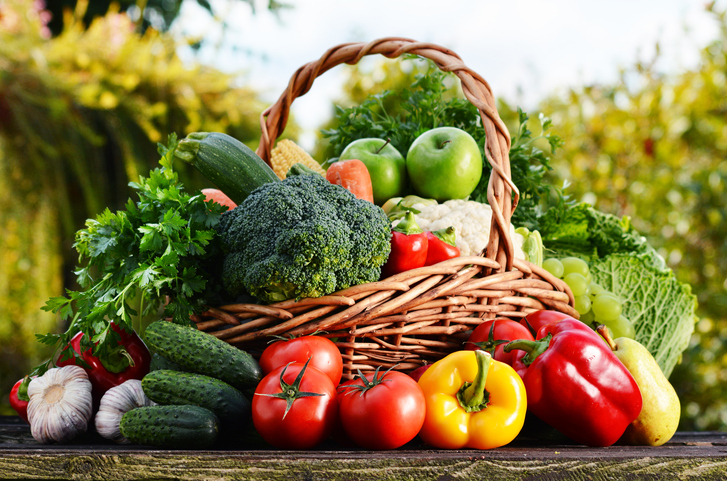How Eat Your Way To A Healthier Menopause
You are what you eat is certainly a very familiar saying, but did you realise what a difference your diet could make to your symptoms at Menopause?

Some risk factors and symptoms linked with ageing and menopause can’t be changed. But good nutrition can help prevent or ease certain conditions that may develop during and after menopause.
Best menopause dietary guidelines
Throughout life eating a variety of foods is essential to get all the nutrients you need. At menopause however many women’s diets are often low in some elements such as iron and calcium.
Here’s what is helpful:
Get enough calcium. Eat and drink two to four servings of dairy products and calcium-rich foods a day. You will find it in in dairy products, fish with bones (such as sardines and canned salmon), broccoli, and legumes. Aim to get 1,200 milligrams per day.
Increase your iron. Eat at least three servings of iron-rich foods a day from lean red meat, poultry, fish, eggs, leafy green vegetables, spinach, nuts, dried apricots and enriched grain products.
You can improve your body’s absorption by eating foods containing vitamin C, vitamin A, along with meat, fish, and poultry during your meals. On the other hand, foods containing phytates (cereals and grains), calcium (milk and dairy), and polyphenols (tea and coffee) can hinder iron absorption.
The recommended dietary allowance for iron in older women is 8 milligrams a day, so if not getting that from your diet try supplementing instead.
Get enough fibre. Help yourself to foods high in fibre, such as whole-grain breads, cereals, pasta, rice, fresh fruit, and vegetables. Most adult women should get about 21 grams a day.
Eat fruit and vegetables. Have at least one and a half cups of fruit and 2 cups of vegetables each day.
What else?
You need information to optimise your diet so always read labels on any packaged food you buy. Use it to help yourself make the best choices for a healthy lifestyle.
Drink plenty of water because you need it for many of your body’s essential functions and always have a glass of water first thing to replenish fluid lost overnight.
As a general rule, drink eight glasses of water every day – approximately 1.2 litres – but not all at once. Spread throughout the day and avoid signs of low fluid intake such as nausea, fatigue, constipation, headaches, and dizziness.
Maintain a healthy weight and if you’re overweight, cut down on portion sizes and eat fewer foods that are high in fat.
Don’t go on a crash diet or skip meals as that won’t help you maintain a good body weight long term,
Cut back on high-fat foods and reduce cholesterol Fat should provide 25% to 35% or less of your total daily calories. Of that do limit saturated fat to less than 7% of your total daily calories and cholesterol to 300 milligrams or less per day.
Saturated fat raises cholesterol and boosts your risk for heart disease and found in fatty meats, whole milk, ice cream, and cheese. Also watch out for trans fats, found in vegetable oils, many baked goods, and some margarines ad they raise cholesterol and increases your risk for heart disease.
Use sugar and salt sparingly because too much sodium in the diet is linked to high blood pressure. Also, go easy on smoked and salt-cured foods as these have high levels of nitrates, which have been linked to cancer.
Having too much sugar can contribute too many calories, which can lead to weight gain. Being overweight increases your risk of health problems such as heart disease, some cancers and type 2 diabetes.
Limit alcohol to one or fewer drinks a day as, for a lot of women, alcohol can make menopausal symptoms worse.
It can trigger hot flushes and night sweats and lead to poor sleep. It can also affect your mood and exacerbate some of the more psychological menopausal symptoms, like anxiety and low mood.
Best foods for menopause symptoms
Plant-based foods that have isoflavones work in the body like a weak form of oestrogen and it is for this reason soy may help relieve menopause symptoms.
Some may help lower cholesterol levels and have been suggested to relieve hot flushes and night sweats. Isoflavones can be found in foods such as tofu and soy milk.
Worst foods for menopause symptoms
For most women hot flushes are the most common problem and it definitely helps to avoid certain “trigger” foods and drinks, like spicy foods, caffeine, smoking and alcohol.
Other problem triggers can be tight clothing and definitely stress and anxiety which will make any symptom more severe.
Helpful information:
Hormone balance is also the key to getting symptoms under control and if at risk for osteoporosis then consider adding more calcium to your diet and increase vitamin D foods to help absorption.
These include fatty fish and seafood, mushrooms, egg yolks and some fortified foods and women ages 51 to 70 should get 600 IU each day, over 70 should get 800 IU daily. More than 4,000 IU of vitamin D each day is not recommended, because it may harm the kidneys and weaken bones.
If you think you may be lacking in hormone protection, but not sure what you may need, then the following article will be helpful.
https://anna.blog.wellsprings-health.com/which-hormone-or-hormones-might-you-need/


















